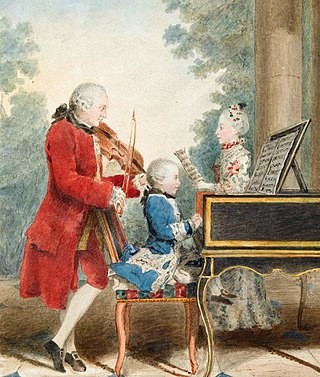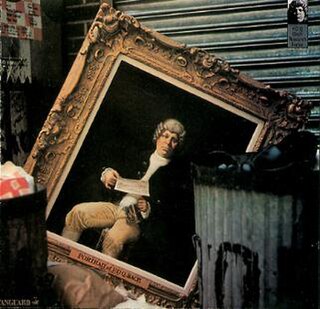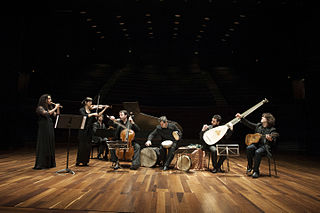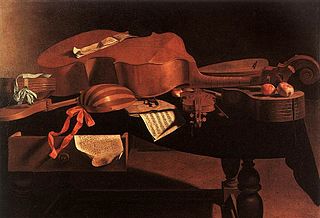Related Research Articles

The Classical Period was an era of classical music between roughly 1750 and 1820.

An orchestra is a large instrumental ensemble typical of classical music, which combines instruments from different families. There are typically four main sections of instruments:
A concerto is, from the late Baroque era, mostly understood as an instrumental composition, written for one or more soloists accompanied by an orchestra or other ensemble. The typical three-movement structure, a slow movement preceded and followed by fast movements, became a standard from the early 18th century.

Johann Nikolaus Harnoncourt was an Austrian conductor, known for his historically informed performances. He specialized in music of the Baroque period, but later extended his repertoire to include Classical and early Romantic works. Among his best known recordings are those of Bach, whose 193 cantatas he recorded with Gustav Leonhardt.

Johann Christian Bach was a German composer of the Classical era, the youngest son of Johann Sebastian Bach. He received his early musical training from his father, and later from his half-brother, Carl Philipp Emanuel Bach in Berlin. After his time in Berlin he made his way to Italy to study with famous Padre Martini in Bologna. While in Italy, J.C. Bach was appointed as an organist at the Milan Cathedral. In 1762 he became a composer to the King’s Theatre in London where he wrote a number of successful Italian operas and became known as "The English Bach". He is responsible for the development of the sinfonia concertante form. He became one of the most influential figures of the classical period, influencing compositional styles of prolific musicians like Haydn and Mozart.

A piano concerto, a type of concerto, is a solo composition in the classical music genre which is composed for piano accompanied by an orchestra or other large ensemble. Piano concertos are typically virtuosic showpieces which require an advanced level of technique. Piano concertos are typically written out in music notation, including sheet music for the pianist, orchestral parts, and a full score for the conductor.

Toccata is a virtuoso piece of music typically for a keyboard or plucked string instrument featuring fast-moving, lightly fingered or otherwise virtuosic passages or sections, with or without imitative or fugal interludes, generally emphasizing the dexterity of the performer's fingers. Less frequently, the name is applied to works for multiple instruments.

P. D. Q. Bach is a fictional composer created by the American composer and musical satirist Peter Schickele for a five-decade career performing the "discovered" works of the "only forgotten son" of the Bach family. Schickele's music combines parodies of musicological scholarship, the conventions of Baroque and Classical music, and slapstick comedy. The name "P. D. Q." is a parody of the three-part names given to some members of the Bach family that are commonly reduced to initials, such as C. P. E. for Carl Philipp Emanuel Bach; PDQ is an initialism for "pretty damned quick".

Historically informed performance is an approach to the performance of classical music which aims to be faithful to the approach, manner and style of the musical era in which a work was originally conceived.
The organ repertoire is considered to be the largest and oldest repertory of all musical instruments. Because of the organ's prominence in worship in Western Europe from the Middle Ages on, a significant portion of organ repertoire is sacred in nature. The organ's suitability for improvisation by a single performer is well adapted to this liturgical role and has allowed many blind organists to achieve fame; it also accounts for the relatively late emergence of written compositions for the instrument in the Renaissance. Although instruments are still disallowed in most Eastern churches, organs have found their way into a few synagogues as well as secular venues where organ recitals take place.

A natural trumpet is a valveless brass instrument that is able to play the notes of the harmonic series.
An early music revival is a renewed interest in music from ancient history or prehistory. The general discussion of how to perform music from ancient or earlier times did not become an important subject of interest until the 19th century, when Europeans began looking to ancient culture generally, and musicians began to discover the musical riches from earlier centuries. The idea of performing early music more "authentically", with a sense of incorporating historically informed performance, was more completely established in the 20th century, creating a modern early music revival that continues today.
Oregon Bach Festival (OBF) is an annual celebration of the works of Johann Sebastian Bach and his musical legacy, held in Eugene, Oregon, United States, in late June and early July.

Classical music generally refers to the art music of the Western world, considered to be distinct from Western folk music or popular music traditions. It is sometimes distinguished as Western classical music, as the term "classical music" can also be applied to non-Western art musics. Classical music is often characterized by formality and complexity in its musical form and harmonic organization, particularly with the use of polyphony. Since at least the ninth century it has been primarily a written tradition, spawning a sophisticated notational system, as well as accompanying literature in analytical, critical, historiographical, musicological and philosophical practices. A foundational component of Western culture, classical music is frequently seen from the perspective of individual or groups of composers, whose compositions, personalities and beliefs have fundamentally shaped its history.

Johann Sebastian Bach was a German composer and musician of the late Baroque period. He is known for his prolific output across a variety of instruments and forms, including the orchestral Brandenburg Concertos; solo instrumental works such as the cello suites and sonatas and partitas for solo violin; keyboard works such as the Goldberg Variations and The Well-Tempered Clavier; organ works such as the Schubler Chorales and the Toccata and Fugue in D minor; and choral works such as the St Matthew Passion and the Mass in B minor. Since the 19th-century Bach Revival, he has been widely regarded as one of the greatest composers in the history of Western music.

St. Thomas School, Leipzig is a co-educational and public boarding school in Leipzig, Saxony, Germany. It was founded by the Augustinians in 1212 and is one of the oldest schools in the world.
Boston Baroque is the oldest period instrument orchestra in North America. It was founded in 1973 by the American harpsichordist and conductor, Martin Pearlman, to present concerts of the Baroque and Classical repertoire on period instruments, drawing on the insights of the historical performance movement.

Baroque music refers to the period or dominant style of Western classical music composed from about 1600 to 1750. The Baroque style followed the Renaissance period, and was followed in turn by the Classical period after a short transition. The Baroque period is divided into three major phases: early, middle, and late. Overlapping in time, they are conventionally dated from 1580 to 1650, from 1630 to 1700, and from 1680 to 1750. Baroque music forms a major portion of the "classical music" canon, and is widely studied, performed, and listened to. The term "baroque" comes from the Portuguese word barroco, meaning "misshapen pearl". The works of Antonio Vivaldi, George Frideric Handel and Johann Sebastian Bach are considered the pinnacle of the Baroque period. Other key composers of the Baroque era include Claudio Monteverdi, Domenico Scarlatti, Alessandro Scarlatti, Alessandro Stradella, Tomaso Albinoni, Johann Pachelbel, Henry Purcell, Georg Philipp Telemann, Jean-Baptiste Lully, Jean-Philippe Rameau, Marc-Antoine Charpentier, Arcangelo Corelli, François Couperin, Johann Hermann Schein, Heinrich Schütz, Samuel Scheidt, Dieterich Buxtehude, Gaspar Sanz, José de Nebra, Antonio Soler, Carlos Seixas, Adam Jarzębski, Jan Dismas Zelenka, Heinrich Ignaz Franz Biber and Giovanni Battista Pergolesi.
Johann Sebastian Bach's music has been performed by musicians of his own time, and in the second half of the eighteenth century by his sons and students, and by the next generations of musicians and composers such as the young Beethoven. Felix Mendelssohn renewed the attention for Bach's music by his performances in the 19th century. In the 20th century Bach's music was performed and recorded by artists specializing in the music of the composer, such as Albert Schweitzer, Helmut Walcha and Karl Richter. With the advent of the historically informed performance practice Bach's music was prominently featured by artists such as Nikolaus Harnoncourt, Gustav Leonhardt and Sigiswald Kuijken.

Classical music – Art music of the Western world, considered to be distinct from Western folk music or popular music traditions.
References
- 1 2 3 4 5 6 7 America, Early Music (2019-05-13). "Boulder Bach Festival Goes Beyond Bach » Early Music America". Early Music America. Retrieved 2023-12-13.
- ↑ "DenverPost.com - Entertainment/The Scene". extras.denverpost.com. Retrieved 2023-12-13.
- ↑ Camera, Kalene McCort | Boulder Daily (2019-04-25). "Boulder Bach Festival finale reinvigorates classics with sounds of Romanticism". Boulder Daily Camera. Retrieved 2023-12-13.